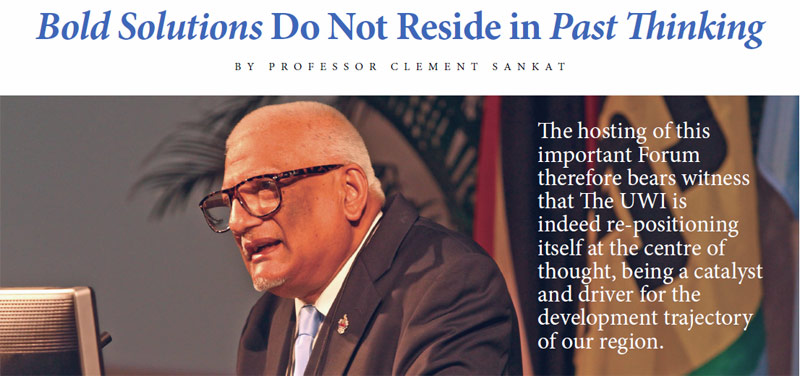|
June 2015

Issue Home >>
|

Today marks a defining moment in the history of our region as we initiate a new dialogue and begin a novel journey that challenges the status quo and philosophical paradigms of traditional Caribbean development. Our aim is to create a fresh dispensation of ideas, thoughts and actions that will help our region reposition itself as an important player on the international stage and secure sustainable development in an ever-evolving and competitive world system.
Before I continue, I must tell you how thrilled I am that this transformative and mould-breaking forum is taking place right here on the grounds of our University. It brings to memory the vision of our founding fathers captured in the Irvine Commission Report of 1944. This report envisioned the regional UWI, “to be something more than the best possible institution for production of our graduates. It should be ‘The Intellectual Centre of our Region’.”
The hosting of this important Forum therefore bears witness that The UWI is indeed re-positioning itself at the centre of thought, being a catalyst and driver for the development trajectory of our region. Let me thank the Ministry of Foreign Affairs and the UNDP in particular, and all the other supporting agencies for collaborating to host this Forum. And most importantly, let me thank all of you, our distinguished guests and stakeholders from various sectors for taking time out of your busy schedules to be present with us today.
It is imperative that as a region, we shift gears and look towards the future. The time in which we live demands new thoughts and new paradigms which will result in new solutions. We need to create a new vision for our region, our countries, our institutions and ourselves. As I reflected upon the future of the Caribbean myself, I could not help but think of some of the possibilities. This morning, I think aloud and share some of my thoughts with you.
- What if we removed every barrier to trade for manufactured and agricultural goods within the Caribbean region that have been certified by their States of origin?
- What if we ensured the free movement of people within the Caribbean region? Or what if we created a Union of Caribbean States?
- What if we brought together the resources of the Caribbean including capital, technology, labour, energy, manufacturing, production and distribution knowledge, our land and marine assets, etc. to build a robust production capability within the region – a matter which the late Professor Norman Girvan passionately advocated since the 1960s, but a matter that has never materialized up to today, much to our region’s loss?
- What if Trinidad and Tobago utilized its geographic location and became a trans-shipment hub for goods going to South America, would this not open up the Latin American market of over 350 million people to Caribbean and global exporters? What if we build a bridge from Trinidad to Venezuela?
- What if the regional UWI becomes the leading university not only for the English-speaking Caribbean, but also for the Spanish, French and Dutch-speaking Caribbean, thereby serving great numbers of students from these countries; What if the regional UWI introduces a liberal fee regime that opens itself up to the wider world, including the sons and daughters of the West Indian diaspora and those from our ancestral origins?
- What if all our State-funded higher education institutions, universities, colleges and technical institutes are brought together to form one regional collegiate system anchored in quality, technology, mobility and efficiency?
- What if all the countries of our region implemented legislation with structured funding for research at 1% of our GDP? Or what if there was a regional research funding agency (funded also as a percentage of each country’s GDP), could we imagine how this may propel problem-solving, creativity, innovation and knowledge generation for our societies?
- What if university funding was guaranteed and enshrined in the constitutions of our countries in the region and as a percentage of GDP, as it is in some Latin American countries, could we imagine how this will remove all publicly funded universities from the financial challenges of the day?
- What if the countries of our region implemented long and medium-term visions, strategies, direction and major capital development projects which cannot be changed through the electoral cycle (apart from exceptional circumstances)?
I ask you distinguished ladies and gentlemen, to ponder upon some of these questions, and I hope that more of these will be generated today, for although probing these questions may be seen in some quarters as ‘radicalism’ at work, I say that in the context of an ever-evolving world system, bold solutions to our present challenges and building an exciting future for our peoples will not reside in past thinking. I am therefore of the firm belief that we must speak about fresh ideas, concepts and models; pursue new perspectives and paradigms; while discarding inappropriate old approaches. This is the spirit and philosophy behind this Forum on the Future of the Caribbean. Bold thinking must no longer be on the periphery, it must now be at the center. This is not to say that we must forget our past, our rich history and the significant strides we have made post-independence, but the time has come for us to begin to think outside the box, to be creative, innovative and industrious if our region is to achieve sustainable development! Hopefully, this Forum will begin to interrogate some of these issues, remembering that The UWI must always remain a space for critical thought.
These are the opening remarks made by Pro Vice-Chancellor and St. Augustine Campus Principal, Professor Clement Sankat at the Forum on the Future of the Caribbean at the Teaching and Learning Complex, UWI St. Augustine Campus on May 5, 2015. |





